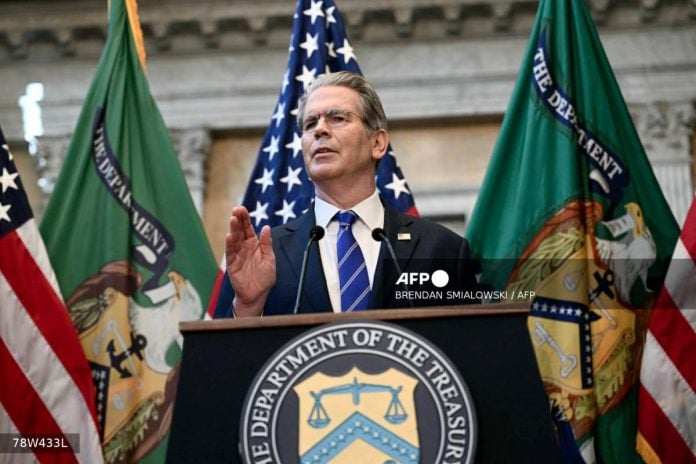WASHINGTON: U.S. Treasury Secretary Scott Bessent said on Friday he expects to meet next week with Chinese Vice Premier He Lifeng in Malaysia to try to forestall an escalation of U.S. tariffs on Chinese goods that President Donald Trump said was unsustainable.
Bessent made the announcement during a White House cabinet meeting and later confirmed plans for a meeting after a call with He on Friday evening. Bessent said on X the two officials “engaged in frank and detailed discussions regarding trade between the United States and China.”
“We will meet in-person next week to continue our discussions,“ Bessent wrote.
China state news agency Xinhua reported that He and Bessent had “candid, in-depth, and constructive discussions on major issues in bilateral economic and trade relations” in a video call, and agreed to a new round of trade talks as soon as possible.
The two officials previously met in four European cities over six months to hammer out a tariff truce that brought duties down from triple-digit levels for each country. That agreement expires on November 10.
A meeting in Malaysia would shift the venue to a Southeast Asian exporter that trades heavily with both China and the U.S. and whose goods are now subject to a 19% duty imposed by Trump. Malaysia also faces a threatened 100% U.S. tariff on its semiconductors and derivative electronics devices under a national security trade review.
Trump earlier on Friday blamed Beijing for the latest impasse, a dispute over China’s sweeping new export restrictions on rare-earth minerals and magnets. He has threatened an additional 100% tariff on Chinese imports starting on November 1 unless Beijing scraps the restrictions.
Asked whether such a high tariff was sustainable and what that might do to the U.S. economy, Trump replied: “It’s not sustainable, but that’s what the number is.”
“They forced me to do that,“ he said in an interview with Fox Business Network that was broadcast on Friday.
Trump also has threatened to impose new U.S. export controls that would halt supplies of “any and all critical software.”
The new trade actions were Trump’s reaction to China dramatically expanding its export controls on rare-earth elements. China dominates the market for such elements, which are essential to tech manufacturing.
Bessent and U.S. Trade Representative Jamieson Greer on Wednesday blasted the restrictions as a threat to global supply chains.
Trump also confirmed he would meet with Chinese President Xi Jinping in two weeks in South Korea and expressed admiration for the Chinese leader.
“I think we’re going to be fine with China, but we have to have a fair deal. It’s got to be fair,“ Trump said on FBN’s “Mornings with Maria,“ which was taped on Thursday.
Later, as he was preparing to have lunch at the White House with Ukrainian President Volodymyr Zelenskiy to discuss efforts to end its war with Russia, Trump said: “China wants to talk, and we like talking to China.”
The softening in tone and affirmation of his intent to meet with Xi helped stem Wall Street’s early losses on Friday. Major U.S. stock indexes, which have been rattled over the last week by Trump’s abrupt re-imposition of steep levies on Chinese imports and by credit worries among regional banks, were up in afternoon trading.
WTO URGES DE-ESCALATION OF TRADE SPATS
The head of the World Trade Organization urged the U.S. and China to de-escalate trade tensions, warning that a decoupling by the world’s two largest economies could reduce global economic output by 7% over the longer term.
WTO Director-General Ngozi Okonjo-Iweala told Reuters in an interview the global trade body was extremely concerned about the latest spike in U.S.-China trade tensions and had spoken with officials from both countries to encourage more dialogue.
But tensions continued to run high, even as Trump and Xi prepared to meet.
Bessent took aim at China’s state-driven economic practices in a statement to the IMF’s steering committee on Friday, urging the IMF and World Bank to take a tougher stance on China’s external and internal imbalances and industrial policies that U.S. officials say have helped China build up excess manufacturing capacity that is flooding the world with cheap goods.
And China’s Commerce Ministry on Friday accused the U.S. of undermining the rules-based multilateral trading system since the Trump administration took office in 2025, vowing to intensify its use of dispute settlement actions at the WTO.
It also urged the U.S. to roll back measures that breach non-discrimination rules and align its industrial and security policies with WTO obligations.
Bessent earlier in the week had accused one of He’s top aides of being “unhinged” in recent interactions with U.S. trade negotiators. China said on Friday that Bessent’s remarks “seriously distort the facts.” – Reuters








